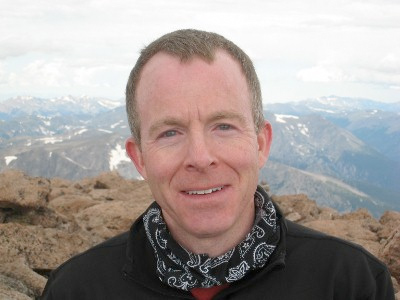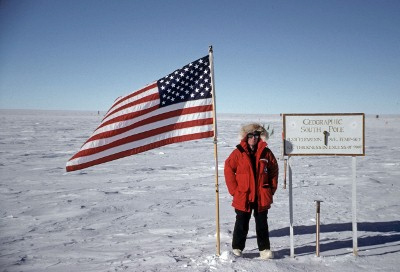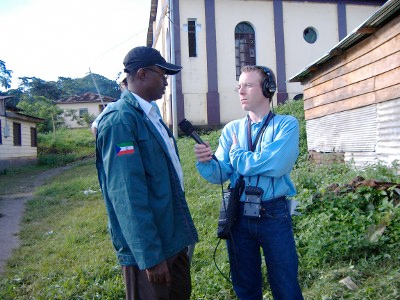David Baron has spent more than two decades covering global issues as a journalist, author, and broadcaster. His assignments have taken him from the South Pole to Iceland, from Uganda to India and beyond in pursuit of stories with scientific topics as wide-ranging as David himself.
After graduating from Yale with a degree in Physics, David jumped into radio. Since then, he’s been a science reporter for National Public Radio on such programs as All Things Considered, Morning Edition, and Weekend Edition. He also served as substitute host for Talk of the Nation: Science Friday. In 2005, David joined Public Radio International where he currently oversees coverage of science and medicine for The World, a joint venture of PRI, the BBC, and WGBH Boston.

David Baron on Long’s Peak in Colorado. |
Mr. Baron has received many honors for his work, such as the duPont-Columbia and Lowell Thomas Awards, as well as many science journalism prizes from the American Medical Association, the American Society for Microbiology, and the American Association for the Advancement of Science. In 2003, David received a Colorado Book Award for his first book, The Beast in the Garden: A Modern Parable of Man and Nature, which explores the human-cougar conflict of the Rocky Mountain West. In 2009, David was the recipient of a first-place award from the Society of Environmental Journalists for his series on land use, Shifting Ground which aired on NPR’s All Things Considered.
When not traveling the world on assignment, David can often be found hiking in the Rockies near his home in Boulder, Colorado.
Morgan Erickson-Davis: How did you get your start as a writer?
David Baron: Writing was not a natural career choice for me. In fact, when I was in college, I dreaded writing so much that I avoided classes that required it. Back then, my passions were science (I majored in physics and geology) and radio (I ran the college radio station), so after graduating I decided to merge my interests and see if I could make a living as a public radio science journalist. I got a job with station WBUR in Boston, and then with NPR. Of course, being a radio journalist requires writing, and after years of writing radio scripts I felt ready to explore other outlets – newspapers, magazines, and eventually a book. I’m pleased with how my career has evolved, but I never intended to reach this destination.
Morgan Erickson-Davis: You’ve traveled extensively while on assignment. Any favorites come to mind?
David Baron: I love visiting places that put me in touch with – I know it sounds cheesy – the grandeur of nature. I once had the good fortune to visit the South Pole, and standing at the bottom of the earth surrounded by the vast, white nothingness was an unworldly experience. Torres del Paine National Park in southern Chile, with its soaring spires of granite, also humbled me. But the day I’ll most remember was one I spent in southeastern Iceland. In less than 24 hours, I flew over an erupting volcano, witnessed a solar eclipse, and then – after dark – watched ribbons of the aurora borealis shimmer and undulate against the Milky Way. It made me feel like a speck of dust in the universe. Odd to say, but I find that very satisfying.
Morgan Erickson-Davis: What conservation issues most interest you?

David Baron at the South Pole, Antarctica. |
David Baron: The environmental issues I write about tend to involve wildlife and land use, but what really interests me is people. How do people think about, and relate to, wild animals? How do people think about, and relate to, the land? One thing I love about environmental issues is that they’re so complicated. There are rarely right or wrong answers. For instance, my book (The Beast in the Garden) explores the growing conflict between people and mountain lions in America’s suburbs. Folks who live in lion country often express strong opinions. Some loathe lions and want them removed from residential areas, while others adore the animals and want them protected even if a lion ends up maiming or killing a human being. I don’t believe one side of this conflict can claim to be “right.” I mean, assuming we’re not going to kill off every last lion or allow every lion to roam wherever it wants (downtown Seattle? Chicago? New York?), we need to decide collectively how many lions we want, where we want them, and how we should manage them. Different people come to different conclusions based on their values and their tolerance for risk. It’s a messy process, but that’s what makes it fascinating.
Morgan Erickson-Davis: How did you become interested in exploring the human-cougar conflict?
David Baron: It all started with a story I did for NPR’s All Things Considered in 1996. I visited a town in California where a jogger had recently been killed by a cougar. I’m embarrassed to admit it, but at the time I was woefully ignorant about mountain lions. I thought cougars were the same size as bobcats, and I assumed they were an endangered species. When I learned that mountain lions are as big as leopards and that their numbers have grown to the point where they’re living in the suburbs – and occasionally eating people – I was astonished. It seemed like a story out of Africa or India. In fact, to me, cougars look like they belong on another continent. That’s part of what I find so compelling about them, compared with, say, grizzlies or wolves. Mountain lions strike me as mysterious and exotic.
Morgan Erickson-Davis: Since the publication of your book, The Beast in the Garden, what developments have there been in regard to cougar conservation and expansion?

David Baron conducting an interview in Equatorial Guinea. |
David Baron: There have been huge developments. Until recently, cougars were pretty much confined to the western third of the country, with the exception of a small population in Florida (where they’re called Florida panthers). But we’ve seen more and more of the big cats wandering out across the Great Plains – Iowa, Illinois, Missouri, Wisconsin – and even into the Northeast. I recently wrote about a cougar that walked from the Black Hills of South Dakota to Greenwich, Connecticut New York Times – The Cougar Behind Your Trash Can. I expect more cougars will follow.
Morgan Erickson-Davis: Any interest in writing another book?
David Baron: I’d love to, but only if I can find another topic and another story that absolutely obsess me. Otherwise, why go to all that trouble? I’ve got some ideas, but nothing definite yet.
Morgan Erickson-Davis: What would you say is the most important thing you’ve learned about environmental writing?
David Baron: Good environmental writing isn’t that different from good writing of any other sort. It benefits from strong characters, a sense of drama, and a storyline that avoids clichés. It’s very easy when writing about the environment to fall into a rote narrative, where the reader (or listener, in the case of radio) knows where the story is going and who the good guys and bad guys are. My goal is to surprise my audience, perhaps even to leave them a bit unsettled. If we just tell people what they want to hear, our readers aren’t going to learn anything – and, frankly, they’re going to be bored. As a writer, I believe it’s my duty to avoid the predictable.
Morgan Erickson-Davis: Do you have any advice for aspiring environmental writers?
David Baron: Environmental writing should be grounded in a solid understanding of science. Take classes in biology and ecology and hydrology. Read books on climatology. Take advantage of science training provided by organizations like the Metcalf Institute, which offers an annual science immersion workshop for journalists. (Full disclosure: I’m on the institute’s board.) While strong environmental writing is about more than just science, without an understanding of the science you’ll have trouble separating fact from conjecture. And if all you give your readers is dueling opinions – without helping them weigh those opinions – then you’re doing your readers a disservice.
To see what David’s up to, check out his twitter at @dhbaron, or visit www.thebeastinthegarden.com and www.theworld.org to learn more about cougars and The World.
Related articles













